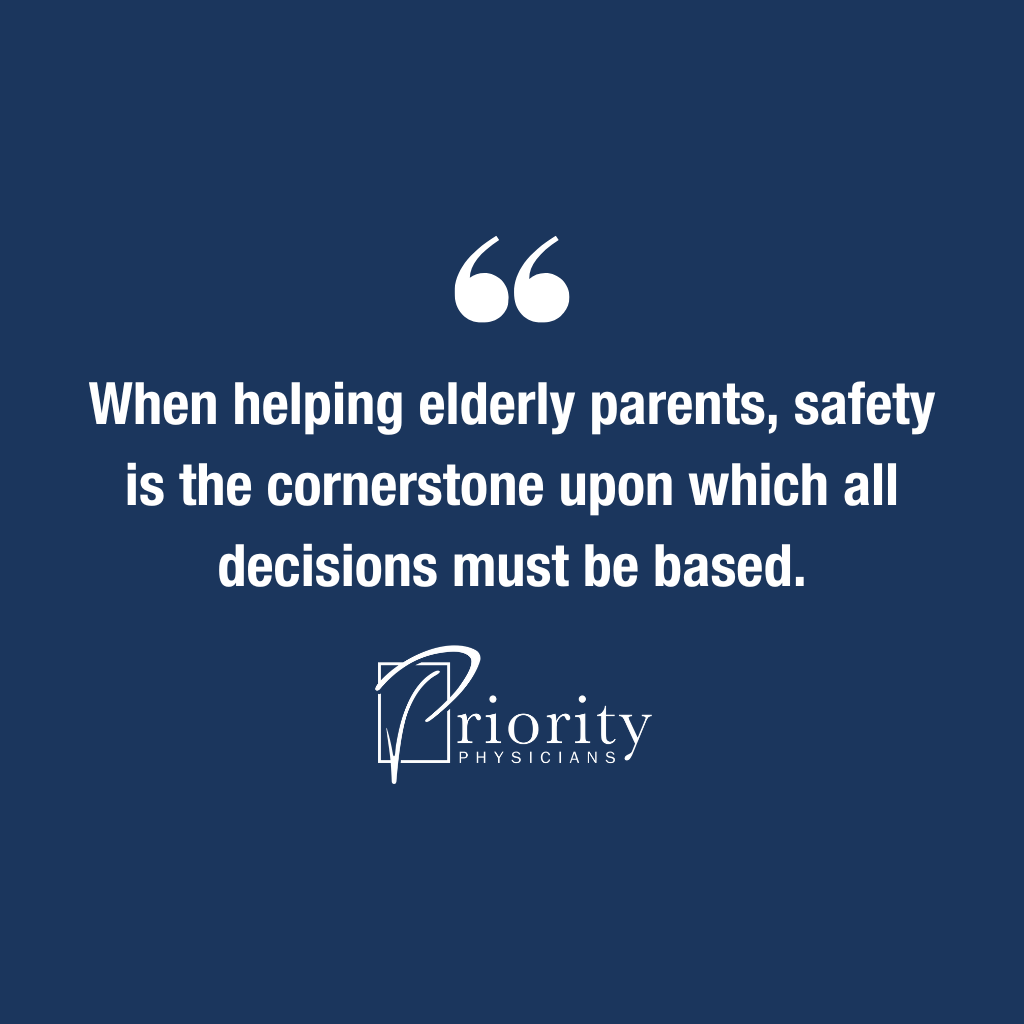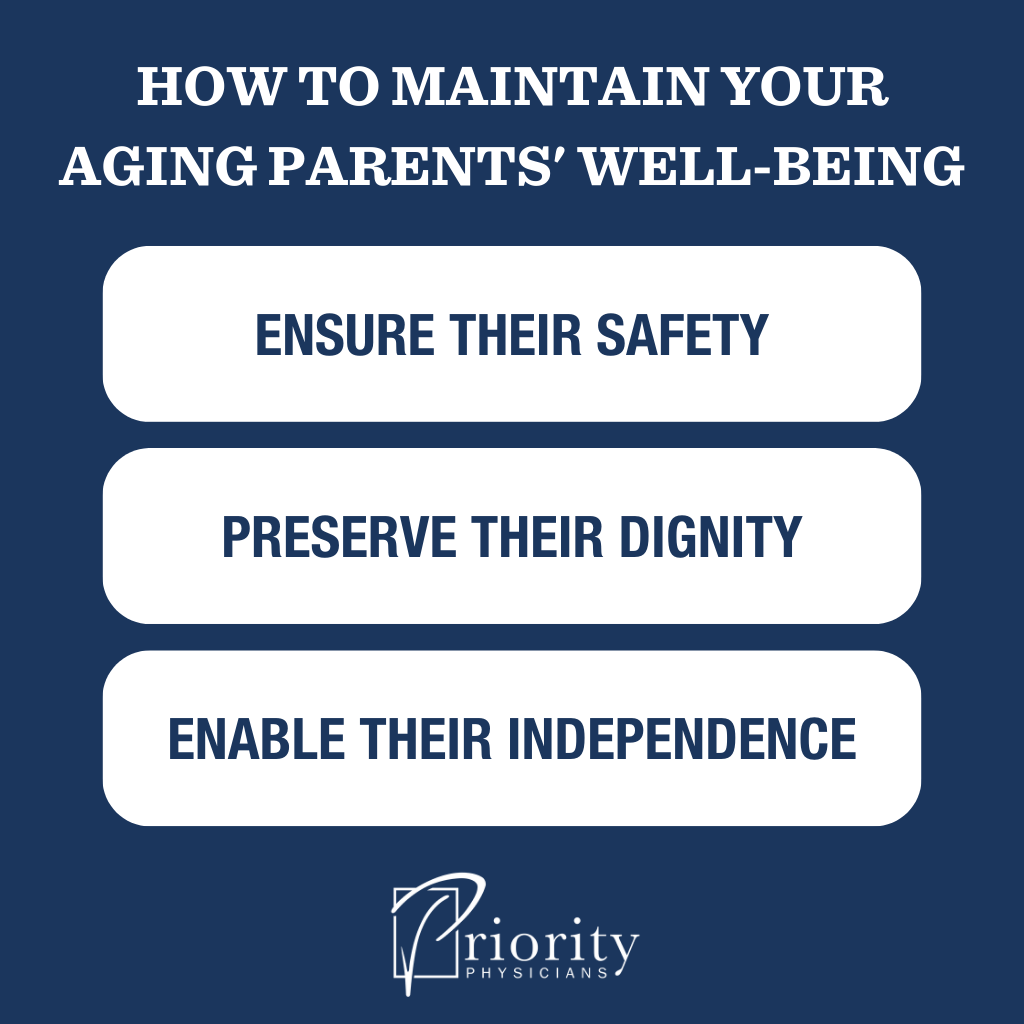Many of my patients are late-phase Baby Boomers and early-phase Gen Xers who are overwhelmed by the effort of caring for their aging parents (early-phase Baby Boomers).
A middle-aged patient helping elderly parents usually won’t come to me for advice, but the subject will come up during his or her annual physical — it has that much of an impact on their health.
When I observe negative symptoms in a patient that stem from stress (sudden lack of exercise, poor diet, etc.), I’ll ask questions about their day-to-day responsibilities. That’s where the subject comes up.
The Stress of Helping Elderly Parents
My patients mention their struggles in helping their elderly parents navigate increasing health problems and decreasing independence. Late-phase Boomers and early-phase Gen Xers are essentially experiencing role reversal — suddenly, they’re the decision-maker for their aging parents’ needs. Their parents begin to feel more like their children, and they don’t know how to manage that new social dynamic.
Often, it’s simply no longer prudent for a senior to live without assistance. That can be a tough chat for the adult child to have with Mom or Dad, who, after years of fierce self-reliance, may resist the notion that they need help. Frankly, these decisions and conversations are some of the tensest, most emotional situations we’ll ever experience — I know I dread them.
When my middle-aged patients start helping elderly parents, I want them to come to me for advice. I try to make them aware of some simple steps they can prioritize, as well as some support systems and resources to help them get started.
Let’s break it down and focus on three main areas of concern critical to your aging parents’ well-being:
- Ensuring their safety
- Preserving their dignity
- Enabling their independence

1. Safety
Our primary mandate is ensuring our aging parents are safe. You’ll find many helpful, detailed elder safety and security checklists online, but here are some basic guidelines to get you started:
Keep parents safe around the home.
Seniors must be able to navigate their living quarters easily. Eliminate any potential tripping or falling risks and ensure parents can see well at night. Evaluate whether modifications are needed so they can climb stairs safely.
In case of fire or other emergencies, be sure your parents have a clear and direct escape route. Manage possible fire hazards, particularly in the kitchen area. If elderly parents can no longer use the stove safely alone, perhaps provide a smartphone with apps that give them easy access to one or more food delivery services (DoorDash, Uber Eats, etc.).
Seniors who are declining physically or cognitively should no longer attempt certain home-maintenance activities, such as lawn-mowing, using power tools, or climbing a stepstool or ladder to change a lightbulb. Consider engaging a handyman service to tackle these tasks for your elder.
Keep parents safe outside the home.
Preventing an aging parent from driving can be one of the most difficult conversations to have, because to many, driving represents independence. When it’s time to have this conversation with Mom or Dad, perhaps gift them with access to a driving service so they can get around safely as needed (Uber, Lyft, etc.).
If your elder tends to get confused or even lost on trips out-of-doors, arrange for a home companion to accompany them outside as needed.
Keep parents’ finances safe.
Over time, aging parents may become fuzzy about their finances. Regularly look through their bank statements and investment reports to ensure accounts are managed properly and balances appear correct.
Some seniors find it difficult to concentrate on monthly bills. They may make payments incorrectly or simply forget to pay on time. Arranging for automatic bill payment can relieve this concern.
Keep an eye on decisions your elders make while shopping. Look at what they’re buying and respectfully question purchases that seem unusual or unnecessary.
Likewise, talk to your aging parents about the need to be cautious if they’re rushed into a “deal” or offered one that seems too good to be true. Both scam artists and charities target older people, enticing them into purchases and donations that can diminish their daily living funds or, in extreme cases, their life savings.
Have a serious chat with your parent before this happens. After it happens, it’s often too late to recoup what’s been lost.
2. Dignity
With our aging parents safe and sound, we can focus on helping them maintain dignity, by which I mean their self-worth and self-respect.
We’ve all heard unfortunate stories about elders who are dismissed as burdensome, with no acknowledgement of their rich history or accomplishments. Aging parents are frequently placed in situations where their feelings are not considered — and they’re typically well aware if they’re being marginalized or stereotyped.
Adult children can interject sensitivity and respect into interactions with parents. Here’s how:
Use a calm tone.
A condescending, harsh tone can undermine a senior’s self-esteem and dignity. Try to stay calm, even if you’re angry or stressed.
Our practice can recommend resources to help you better manage any negative feelings and have pleasant, more productive encounters with your parents.
Give your parents some privacy.
While helping elderly parents, show appreciation for their personal values and sense of decorum. For example, if a parent is incontinent, helping them maintain privacy and dignity may include hiring a visiting nurse to help with personal cleanliness rather than having a family member handle it.
Sit down with your parents to discuss how to give them greater privacy. Perhaps they want time to themselves in the bathroom to shower, while you or a health aide remain outside the door (but nearby, in case of emergency — remember, safety first and foremost).
3. Independence
By giving your aging parents a measure of day-to-day control, you promote a sense of independence. You can do this by focusing on listening and helping them make decisions about their own welfare.
- Lend an ear to your elders’ judgments and concerns. Value their input about their health or other needs.
- Help them make informed choices about their own care by giving them the right information to participate in decisions.
- Give them autonomy to control some of their daily activities — for example, whether to eat out and what restaurant to choose.

Helping Elderly Parents: Final Thoughts
Remember, when helping elderly parents, safety is the cornerstone upon which all decisions must be based. If aging parents maintain their dignity or independence, but their surroundings are unsafe, their situation is not sound. Our elders’ safety should always be our guiding principle.
Above all, if you’re helping elderly parents, don’t try to do it alone! We encourage you to explore some of the many resources available to caregivers today.
Our team at Priority Physicians often advises patients about helping elderly parents. We can help you cope with their needs and alleviate your own stress as well. Locally, we can recommend responsive, dependable help and support, including homecare services that assist elders at all stages of need.
Don’t hesitate to reach out to us for guidance.

